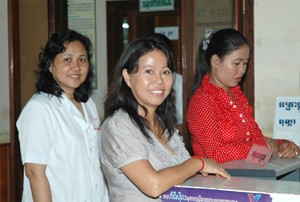
In 1997, Cambodia erupted into violence as rival political parties fought for power. In response, many international donors closed their programs and pulled out of the country. Left behind without administrative and technical support, many Cambodians working in the health sector floundered.
But not the employees of the Reproductive Health Association of Cambodia, a health organization that was founded in 1994 with USAID funding. As one of Cambodia's few locally-run health organizations at the time, it was uniquely positioned to continue its work unimpeded through the crisis. Indeed, instead of merely surviving, it thrived.
"We are Cambodians, and we wanted to show Cambodian society that we could do the job," said Dr. Ouk Vong Vathiny, the organization's executive director.
The organization's success had much to do with its skillful staff and capable leadership. The success was also the result of USAID's efforts to invest heavily in local health organizations by providing them with funding and introducing standards in systems such as accounting and budgeting procedures. By stressing local ownership of local problems, USAID encourages its Cambodian partners to fi nd solutions appropriate for local conditions. Not only does this approach make sense from a problem-solving perspective, but it is also cost-effective.
The USAID-funded organization is now one of Cambodia's most successful and innovative health providers. With a staff of 540 and a network of peer volunteers numbering 19,000, the organization reaches more than a third of the country's population and is successfully tackling some of the most challenging health problems, ranging from reproductive health to HIV/AIDS to tuberculosis. The organization has set the standard for high-quality health care in Cambodia by encouraging citizens to demand better services and requiring providers to improve their level of care. By delivering highquality services at a fraction of the cost of international technical assistance, the Reproductive Health Association of Cambodia has become a model for what local organizations can achieve.
"The donors and the Cambodian government didn't think that local health organizations were capable of being independent," Ouk said. "But our success has changed a lot of minds, including some high-profi le ones. The greatest compliment I received was when the secretary of state for health told me, 'Before, I never trusted that you could do the work, but now I believe you can do it.'"







Comment
Make a general inquiry or suggest an improvement.